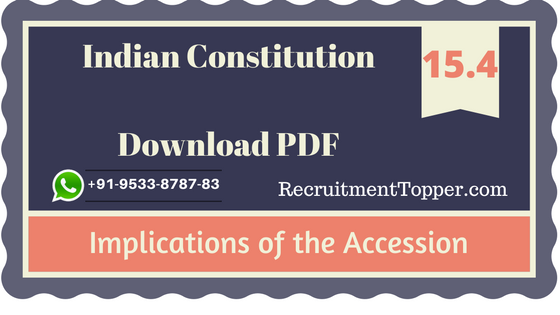Implications of the Accession | Indian Constitution Download PDF
Since the liberality of the Government of India has been misunderstood and misinterpreted in interested quarters, overlooking the legal implications of the Accession of the State to India, we should pause for a moment to explain these legal implications lest they be lost sight of in the turmoil of political events which have clouded the patent fact of the Accession.
The first thing to be noted is that the Instrument of Accession signed by Maharaja Hari Singh on the 26th October, 1947, was in the same form as was executed by the Rulers of the numerous other States which had acceded to India following the enactment of the Indian Independence Act, 1947. The legal consequences of the execution of the Instrument of Accession by the Ruler of Jammu & Kashmir cannot, accordingly, be in any way different from those arising from the same fact in the case of the other Indian States. It may be recalled that owing to the lapse of paramountcy unders. 7(1) (b) of the Indian Independence Act, 1947, the Indian States regained the position of absolute sovereignty which they had enjoyed prior to the assumption of suzerainty by the British Crown. The Rulers of the Indian States thus became unquestionably competent to accede to either of the newly created Dominions of India and Pakistan, in exercise of their sovereignty. The legal basis as well as the form of Accession were the same in the case of those States which acceded to Pakistan and those which acceded to India. There is, therefore, no doubt that by the act of Accession the State of Jammu & Kashmir became legally and irrevocably a part of the territory of India and that the Government of India was entitled to exercise jurisdiction over the State with respect to those matters to which the Instrument of Accession extended. If, in spite of this, the Government of India had given an assurance to the effect that the Accession or the constitutional relationship between India and the State would be subject to confirmation by the people of the State, under no circumstances can any third party take advantage of such extra-legal assurances and claim that the legal act had not been completed.

Leave a Reply